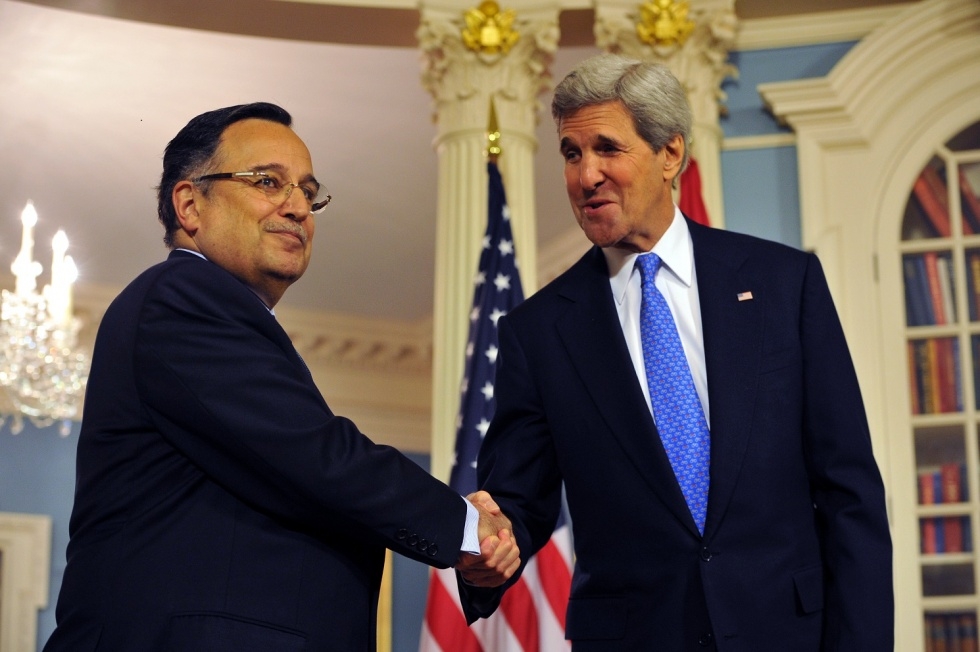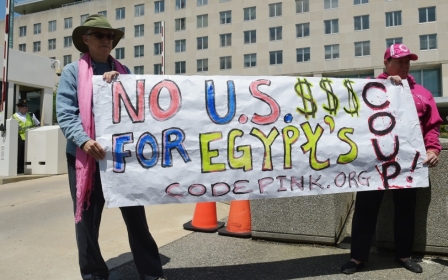Disquiet grows in US over Egypt policy

America’s relationship with the military regime of Egypt and President Barack Obama’s keenness to give military aid to that country have created acrimony between the administration and congress.
The dispute goes beyond Washington, with Obama’s Middle East policy coming under increasing criticism at home and abroad. There are warnings that his administration may be creating more international enemies.
A recent op-ed by Robert Kagan in the Washington Post on 2 May is one example. A leading neoconservative thinker, Kagan was one of the founders of the Project for the New American Century that called for regime change in Iraq and a strategy of America securing global control. Kagan’s wife, Victoria Nuland, is now a senior State Department official in the Obama administration.
Kagan says that far from helping in the struggle against terrorism, as the Egyptian military dictatorship and its supporters claim, the military’s “brutal crackdown on Egypt’s Islamists is creating a new generation of terrorists”. The Muslim Brotherhood did use violence against protestors, he continues, but that is nothing compared with the military’s killing of thousands and jailing of tens of thousands since overthrowing president Mohamed Morsi.
Kagan goes on to warn that the crackdown in which hundreds may be sentenced to death after a trial barely lasting an hour will convince some Islamists to believe that their only choice is to kill or be killed.
His conclusion is that Egypt’s new military strongman, former army chief Abdel Fattah al-Sisi can never bring stability, no matter how ruthless he becomes. America’s current policy is only bringing closer the day of the next revolution, and that revolution will be a “more radical and virulent anti-American event than the last one”.
President Obama’s intention to send military aid to Egypt and bitter criticism from a leading neoconservative hawk such as Robert Kagan look strange. The White House plans to supply Egypt with Apache attack helicopters, arguing that they are needed to fight “terrorism” in the Sinai peninsula. Obama wants to give $650 million worth of additional aid to Egypt’s military regime. Moreover, the administration says that Egypt is abiding by the 1979 peace treaty with Israel.
All of this must be music to Sisi’s ears, but represents a sad turning point in Barack Obama’s journey from soaring idealism to Machiavellian behaviour. Political expediency and short-termism have triumphed over idealism in this journey.
Congressional unease over Obama’s Middle East policy has turned into open rebellion. Senator Patrick Leahy, a Democrat who is chairman of the Senate subcommittee that oversees foreign aid, has told the White House that he would not approve American aid to the Egyptian military.
In particular, Senator Leahy has denounced a summary trial which ended in an Egyptian court sentencing 683 people to death, including the Muslim Brotherhood leader Mohamed Badie. Leahy said that he would remain opposed until he could see “convincing evidence the government is committed to the rule of law”.
Given the Obama administration’s eagerness to supply Egypt’s military rulers with weapons and economic aid, it was odd indeed that the White House expressed alarm over the court’s ruling when the United Nation did so. As severe measures continue against opposition supporters, a powerful insurgency is building up in Egypt. It is especially concentrated in the Sinai peninsula.
The overall character of President Obama’s predecessor George W Bush was distinctly aggressive in military terms. Since the heady days of Obama’s inauguration in January 2009, American policy has undergone a Machiavellian transformation. His pronouncements often do not match facts on the ground.
The Foreign Assistance Act requires that the United States cut aid to any country “whose duly elected head of government is deposed by military coup or decree”. President Obama, however, concluded soon after Morsi was deposed by the military in July 2013 that the White House was not “legally required” to decide whether Egypt’s president was the victim of a coup. An unnamed administration official told the New York Times at the time: “We will not say it was a coup, we will not say it was not a coup, we will just not say [anything]”.
It was like showing green light to Sisi. With each hint of suspension of aid and every expression of “concern” over Egypt’s worsening situation comes something that gives succour to Egypt’s military junta. More than three years after the fall of Hosni Mubarak and a brief democratic interlude, it now looks inevitable that Sisi will be “elected” the country’s new leader at the end of this month.
The election will be an extremely restricted exercise. It will be a reminder of the worst days of the Mubarak era. Sisi will be “endorsed” by an overwhelming majority, with no more than a tiny percentage of votes going against him.
The truth about today’s Egypt is that the real opposition is either in jail or has been forced underground if its supporters have not been killed already. Meanwhile in the United States, influential voices are engaged in a perfunctory exercise to express the mildest of unease with demands that America must ensure that the next Egyptian government “makes good on the people’s demands for a free and prosperous society”, as was written by Evan Moore, a senior policy analyst at the Foreign Policy Initiative, in an op-ed piece published by US News and World Report on 8 May.
As Sisi pursues his repressive policies against Islamist and liberal opponents alike, the Obama administration is advised by these voices to “strategically leverage US assistance to incentivize Cairo to adopt vital political and economic reforms”.
Emboldened by Obama’s refusal to acknowledge that Morsi’s overthrow was a coup, Sisi now says that democracy will take at least 25 years to bring to Egypt, and that too if stability can be restored. Bizarrely, he has described the overthrow of Mubarak in 2011 and Morsi in 2013 as major steps towards democracy.
In less than a year since overthrowing the elected political order which had emerged after a people’s revolution, Sisi has moved to crush Egypt’s largest movement, the Muslim Brotherhood. He has outflanked liberals, many of whom are also on his target. Egyptians are bracing themselves for another long era dominated by a military dictator, who at 59 years of age could maintain his iron grip for a long time. Sisi has President Obama to thank for this gift.
— Deepak Tripathi is a writer with a particular reference to South Asia, the Middle East, the Cold War and America in the world. He is a fellow of the Royal Historical Society and the Royal Asiatic Society of Great Britain and Northern Ireland.
The views expressed in this article belong to the author and do not necessarily reflect the editorial policy of Middle East Eye.
Photo Credit: US Secretary of State John Kerry welcomes Egyptian Foreign Minister Nabil Fahmy in April (AFP)
Middle East Eye propose une couverture et une analyse indépendantes et incomparables du Moyen-Orient, de l’Afrique du Nord et d’autres régions du monde. Pour en savoir plus sur la reprise de ce contenu et les frais qui s’appliquent, veuillez remplir ce formulaire [en anglais]. Pour en savoir plus sur MEE, cliquez ici [en anglais].




